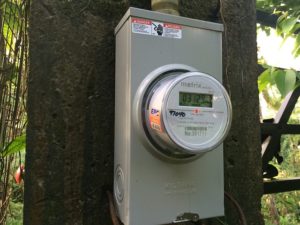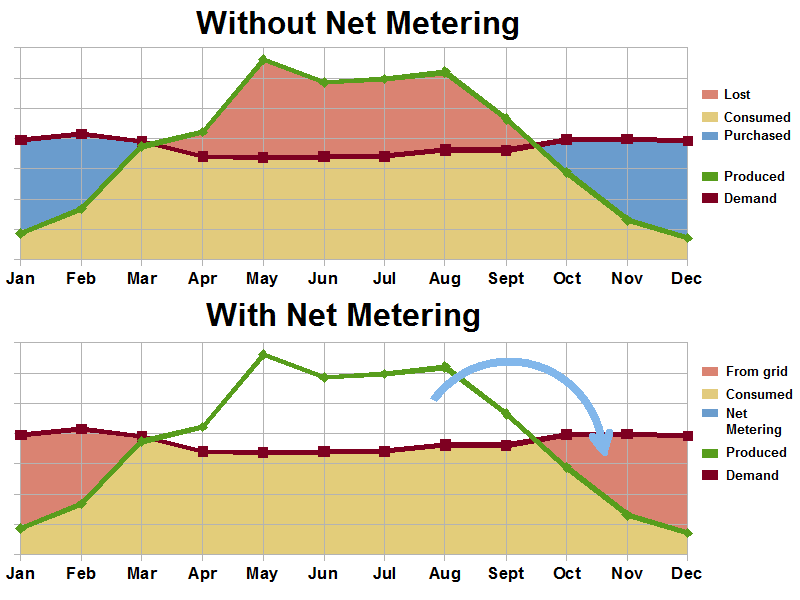 Solar “net metering” allows homeowners to bank extra power from the sunniest days of the year. “Credits” can then power your home through a cloudy day or a long winter, lowering your energy bills all year round. Not every homeowner has access to this program, but if you do: it’s a great way to keep down the costs of going solar!
Solar “net metering” allows homeowners to bank extra power from the sunniest days of the year. “Credits” can then power your home through a cloudy day or a long winter, lowering your energy bills all year round. Not every homeowner has access to this program, but if you do: it’s a great way to keep down the costs of going solar!
Will you be able to take advantage of this program? That depends on three factors: the amount of power that your solar panels produce, the amount of energy your home uses, and the location in which you live. Let’s look at how you can turn solar net metering into savings.
- Solar Net Metering Overview
- Savings with Solar Net Metering
- State-by-State Availability of Solar Net Metering
Solar Net Metering Overview
Homes traditionally draw energy from the “grid” of their town or city. The utility will charge homeowners per kilowatt hour (kWh) they use. But if your home uses solar panels, you’re producing kWh with your own system.
 Depending on your home’s system, your panels can produce more power than you need at one time. If so, that excess power can be sent into your town or city’s power grid. This “net metering” earns you credits from the utility company, which are applied as savings on your energy bill. Plus, the credits can protect your home from losing power.
Depending on your home’s system, your panels can produce more power than you need at one time. If so, that excess power can be sent into your town or city’s power grid. This “net metering” earns you credits from the utility company, which are applied as savings on your energy bill. Plus, the credits can protect your home from losing power.
If you use net metering, your local power company measures the kWh your system produces. It will also measure how much energy your home actually uses. If you make more than you use, the excess is sent into the grid.
The credits for extra kWh hours will provide you with savings. And the clean energy your system produces can actually power other homes in your town! No energy is wasted and the community benefits from the choices you made by going solar and using clean energy.
Considering these big benefits of net metering, you might want to get a home solar panel system that generates a bit more solar kWh than your home needs. It can help you save more on your energy bill and even allow you to earn extra cash if you sell SRECs.
Savings with Solar Net Metering
How exactly does solar net metering help you save?
What if your home needs energy, but your panels aren’t getting enough sunshine that day to power your home? If your solar system uses batteries for storage, that will be your primary resource. Your home will draw on the energy stored in your battery to make up the difference. Once you deplete your battery, then your home will draw conventional power from your local grid. And without batteries, you’ll start drawing from the grid right away. (If you’re not sure whether batteries are right for you, review our solar battery guide.)
If you’re not using net metering, you’ll likely be paying retail rates for the grid power that you’re drawing on during the darker days and months of the year. Metering, however, uses the credits from sunnier days to cover you instead!
When you find yourself drawing from the grid, credits from net metering can cut or even cover your energy bills from the utility company. This is perfect if your system makes a lot of electricity on sunny days but uses more energy to heat your home on cold winter evenings. The credits you banked from sunny days will help balance out your power consumption.

State-by-State Availability of Solar Net Metering
Is your home in the United States? If so, chances are that your area has a metering program! Net metering is used as an incentive for homeowners to start going solar.
Many states offer statewide net metering programs. The states that don’t offer statewide programs are: Alabama, Georgia, Hawaii, Idaho, Mississippi, Nevada, South Dakota, Tennessee, and Texas. But even in those states, net metering might still be available in your area on a local level. Utility companies and regions sometimes offer net metering to strengthen the grid and achieve sustainable energy goals. In Texas and Idaho, a lot of areas have net metering or alternative programs with similar goals.
Solar advocates around the United States are working quickly to push for net metering. This means laws might change in your area at any time, so local contacts will probably have more up-to-date information than you can find online.[1]SEIA If net metering interests you, we recommend that you get in touch with your utility company. They can give you current information about their policies and programs.
Even there isn’t a solar net metering program in your area, there are many other options available for saving while going solar.
(Illustration: energy cost by supalerk laipawat)
